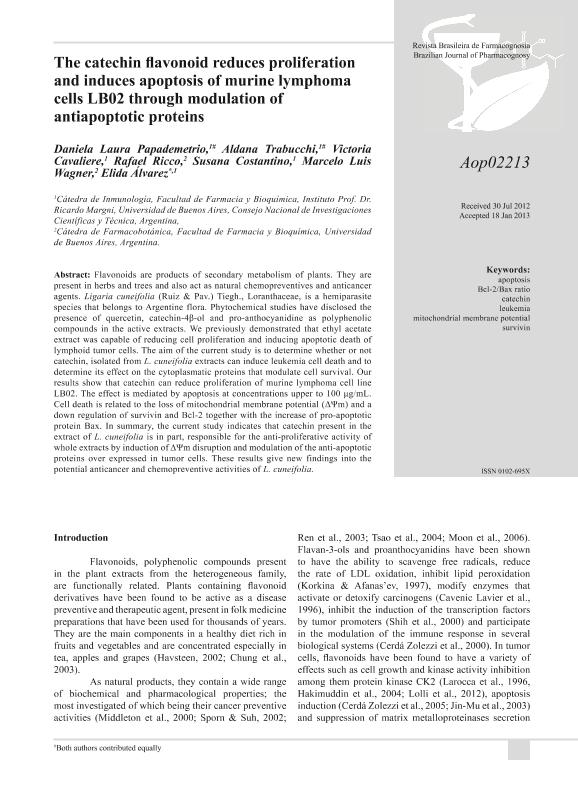Artículo
The catechin flavonoid reduces proliferation and induces apoptosis of murine lymphoma cells LB02 through modulation of antiapoptotic proteins
Papademetrio, Daniela Laura ; Trabucchi, Aldana
; Trabucchi, Aldana ; Cavaliere, Victoria
; Cavaliere, Victoria ; Ricco, Rafael; Costantino, Susana Nora
; Ricco, Rafael; Costantino, Susana Nora ; Wagner, Marcelo; Alvarez Carbonetto, Elida M. del C.
; Wagner, Marcelo; Alvarez Carbonetto, Elida M. del C.
 ; Trabucchi, Aldana
; Trabucchi, Aldana ; Cavaliere, Victoria
; Cavaliere, Victoria ; Ricco, Rafael; Costantino, Susana Nora
; Ricco, Rafael; Costantino, Susana Nora ; Wagner, Marcelo; Alvarez Carbonetto, Elida M. del C.
; Wagner, Marcelo; Alvarez Carbonetto, Elida M. del C.
Fecha de publicación:
05/2013
Editorial:
Sociedade Brasileira de Farmacognosia
Revista:
Revista Brasileira de Farmacognosia
ISSN:
0102-695X
e-ISSN:
1981-528X
Idioma:
Inglés
Tipo de recurso:
Artículo publicado
Clasificación temática:
Resumen
Flavonoids are products of secondary metabolism of plants. They are present in herbs and trees and also act as natural chemopreventives and anticancer agents. Ligaria cuneifolia (Ruiz & Pav.) Tiegh., Loranthaceae, is a hemiparasite species that belongs to Argentine flora. Phytochemical studies have disclosed the presence of quercetin, catechin-4β-ol and pro-anthocyanidine as polyphenolic compounds in the active extracts. We previously demonstrated that ethyl acetate extract was capable of reducing cell proliferation and inducing apoptotic death of lymphoid tumor cells. The aim of the current study is to determine whether or not catechin, isolated from L. cuneifolia extracts can induce leukemia cell death and to determine its effect on the cytoplasmatic proteins that modulate cell survival. Our results show that catechin can reduce proliferation of murine lymphoma cell line LB02. The effect is mediated by apoptosis at concentrations upper to 100 µg/mL. Cell death is related to the loss of mitochondrial membrane potential (ΔΨm) and a down regulation of survivin and Bcl-2 together with the increase of pro-apoptotic protein Bax. In summary, the current study indicates that catechin present in the extract of L. cuneifolia is in part, responsible for the anti-proliferative activity of whole extracts by induction of ΔΨm disruption and modulation of the anti-apoptotic proteins over expressed in tumor cells. These results give new findings into the potential anticancer and chemopreventive activities of L. cuneifolia.
Palabras clave:
Apoptosis
,
Bcl-2/Bax Ratio
,
Leukemia
,
Survivin
Archivos asociados
Licencia
Identificadores
Colecciones
Articulos(IDEHU)
Articulos de INST.DE EST.DE LA INMUNIDAD HUMORAL PROF.R.A.MARGNI
Articulos de INST.DE EST.DE LA INMUNIDAD HUMORAL PROF.R.A.MARGNI
Citación
Papademetrio, Daniela Laura; Trabucchi, Aldana; Cavaliere, Victoria; Ricco, Rafael; Costantino, Susana Nora; et al.; The catechin flavonoid reduces proliferation and induces apoptosis of murine lymphoma cells LB02 through modulation of antiapoptotic proteins; Sociedade Brasileira de Farmacognosia; Revista Brasileira de Farmacognosia; 23; 3; 5-2013; 455-463
Compartir



